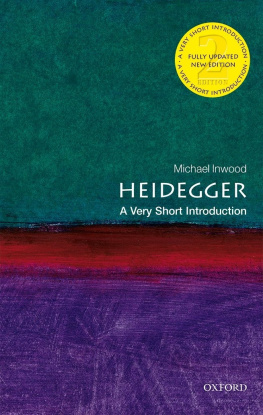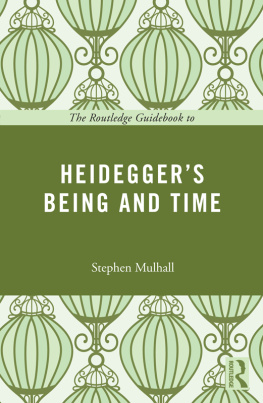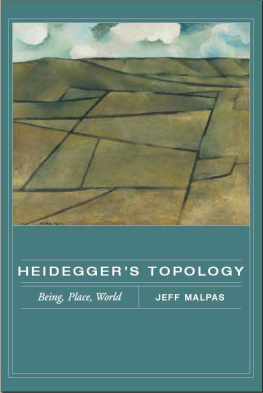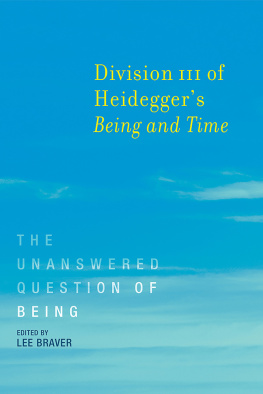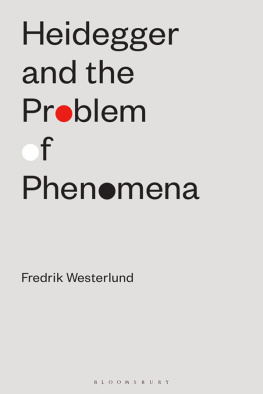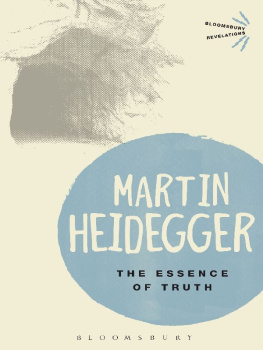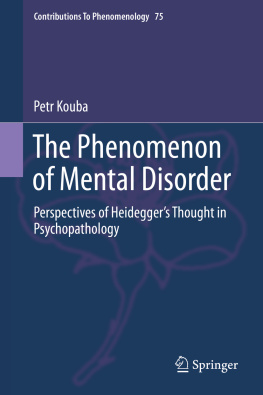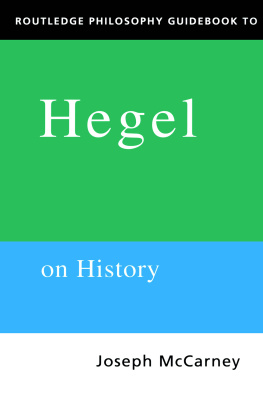Heidegger
Martin Heidegger is one of the twentieth centurys most in fl uential, but also most cryptic and controversial philosophers. His early fusion of phenomenology with existentialism inspired Sartre and many others, and his later critique of modern rationality inspired Derrida and still others. This introduction covers the whole of Heideggers thought and is ideal for anyone coming to his work for the fi rst time.
John Richardson centers his account on Heideggers persistent e ff ort to change the very kind of understanding or truth we seek. Beginning with an overview of Heideggers life and work, he sketches the development of Heideggers thought up to the publication of Being and Time. He shows how that book takes up Husserls method of phenomenology and adapts it. He then introduces and assesses the key arguments of Being and Time under three headingspragmatism, existentialism, and temporalityits three levels of analysis of human experience.
Subsequent chapters introduce Heideggers later philosophy, including his turn towards a historical account of being, and new ideas about how we need to think to get the truth about it; his in fl uential writings on language, art, and poetry, and their role in the Western history of being; and his claim that this history has culminated in a technological relation to things that is deeply problematic, above all in the way it excludes the divine. The fi nal chapter looks at Heideggers profound in fl uence on several intellectual movements ranging from phenomenology to existentialism to postmodernism.
A much-needed and refreshing introduction to this major fi gure, Heidegger is ideal reading for anyone coming to his work for the fi rst time and will interest and stimulate students and scholars alike.
John Richardson is Professor of Philosophy at New York University, USA. He is the author of Existential Epistemology; A Heideggerian Critique of the Cartesian Project (1986), Nietzsche s System (1996), and Nietzsche s New Darwinism (2004). He is a co-editor of Nietzsche (2001) in the series Oxford Readings in Philosophy .
Routledge Philosophers
Edited by Brian Leiter
University of Chicago
Routledge Philosophers is a major series of introductions to the great Western philosophers. Each book places a major philosopher or thinker in historical context, explains and assesses their key arguments, and considers their legacy. Additional features include a chronology of major dates and events, chapter summaries, annotated suggestions for further reading and a glossary of technical terms.
An ideal starting point for those new to philosophy, they are also essential reading for those interested in the subject at any level.
Hobbes
A. P. Martinich
Leibniz
Nicholas Jolley
Locke
E. J. Lowe
Hegel
Frederick Beiser
Rousseau
Nicholas Dent
Schopenhauer
Julian Young
Freud
Jonathan Lear
Kant
Paul Guyer
Husserl
David Woodruff Smith
Darwin
Tim Lewens
Aristotle
Christopher Shields
Rawls
Samuel Freeman
Spinoza
Michael Della Rocca
Merleau-Ponty
Taylor Carman
Russell
Gregory Landini
Wittgenstein
William Child
Forthcoming:
Adorno
Brian OConnor
Plato
Constance Meinwald
Hume
Don Garrett
Dewey
Steven Fesmire
Habermas
Kenneth Baynes
Smith
Eric Schliesser
Mill
Daniel Jacobson
John Richardson
Heidegger

First published 2012
by Routledge
2 Park Square, Milton Park, Abingdon, Oxon, OX14 4RN
Simultaneously published in the USA and Canada
by Routledge
711 Third Avenue, New York, NY 10017
Routledge is an imprint of the Taylor & Francis Group, an informa business
2012 John Richardson
All rights reserved. No part of this book may be reprinted or reproduced or utilised in any form or by any electronic, mechanical, or other means, now known or hereafter invented, including photocopying and recording, or in any information storage or retrieval system, without permission in writing from the publishers.
Trademark notice: Product or corporate names may be trademarks or registered trademarks, and are used only for identi fi cation and explanation without intent to infringe.
British Library Cataloguing in Publication Data
A catalogue record for this book is available from the British Library
Library of Congress Cataloging in Publication Data Richardson, John, 1951-Heidegger / by John Richardson.
p. cm. -- (The Routledge philosophers)
Includes bibliographical references and index.
1. Heidegger, Martin, 1889-1976. I. Title.
B3279.H49R495 2012
193--dc23
2011034785
ISBN: 978-0-415-35070-9 (hbk)
ISBN: 978-0-415-35071-6 (pbk)
ISBN: 978-0-203-12710-0 (ebk)
To Hubert Dreyfus
Contents
One
Life and works
Two
Early development
Three
Being and Time: phenomenology
Four
Being and Time: pragmatism
Five
Being and Time: existentialism
Six
Being and Time: time and being
Seven
Heideggers turning
Eight
Language and art
Nine
Technology and god
Ten
Heideggers influences
Acknowledgments
My founding debt is to Bert Dreyfus, who brought Heidegger to life for me when I was his graduate student at Berkeley. He is also the fi rst cause of my second debt, to the meetings at Asilomar held every summer by (mainly) his former students and in fl uencees. Here I pro fi ted from friendly interaction with the many regular attenders of these meetings, too many to name; my great debts to their individual writing are shown in this book. I am further grateful to those who read and gave valuable reactions to drafts: Je ff Sebo, Tito Magri, Paul Lodge, and (especially) Lee Braver.
A note on translations
Although I cite texts by English language editions, I have revised the translations for the sake of consistency; this is especially important with his later vocabulary, which is translated in a confusing variety of ways in those editions. I have also aimed at simpler and more literal renderings of Heideggers German. In a few cases (Dasein, das Man, Ereignis) I have mainly kept the German. I list some of my translations in the Glossary at the back. But let me mention here one most important case: I translate Heideggers Sein by being and Seiendes by entity; more usually these are both rendered being, relying on context (or by pluralizing Seiendes as beings, or by capitalizing Sein as Being) to distinguish them. Since the di ff erence between these is so crucial to Heideggers thinking, I think a sharper distinction is appropriate.
Abbreviations for Heideggers works
Abbreviations are based on my own translations of Heideggers titles, given below; these sometimes di ff er from the cited editions titles. For each work I also give the German title, the year of initial composition (many pieces he later reworked), the kind of piece it began as (e.g. lecture or lecture-course), and its volume number in the standard edition of Heideggers works, the
Next page







